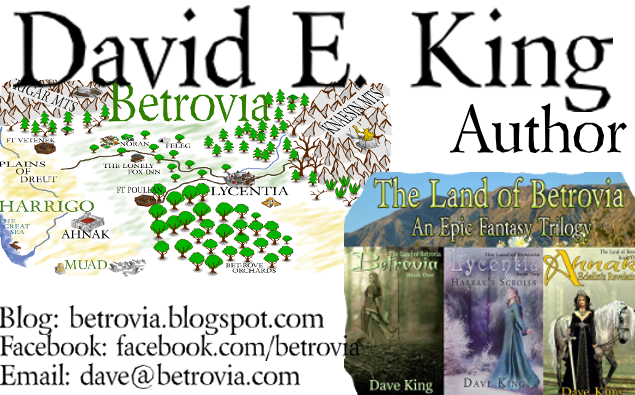Saturday, February 2, 2013
Now what is this "world-building" stuff all about?
As I'm finishing up book three of The Land of Betrovia trilogy (hoping to have book three out by May), I've been thinking about what to do next. Writing "spin-offs" based on the Betrovia universe is one avenue. But another one is starting a science fiction series for young readers. When I was around 13, my mom bought -- at a garage sale, I think -- an entire hardback set of a science-fiction adventure series. There had to be at least 12 books in that set. And I read them all that summer! I think I even went back and re-read most of them months later.
The two main characters were two teenaged-boys who, usually by no fault of their own, got into trouble and worked themselves out of that trouble by the end of each book. I don't remember if the series was specifically chronological (the events of book 1 occurred before those of book 2, etc.), but it doesn't really matter if they weren't. I loved watching those Johnny Quest cartoons on Saturday mornings, and reading that sci-fi adventure series was like watching Johnny and Hadji.
So here's the question I posed to the Writers Cafe novelists: What are some ways to "build" this sci-fi world besides drafting an outline and throwing in the "world" details as part of the outlining process?
"Discussing it with a community of world-builders and doing it step-by-step might work for you. The worldbuilding reddit is fairly friendly. For my current novels, I ran it as an RPG for friends before sitting down and writing the story, it is a process similar to beta-reading but gives you a unique perspective on what other people would do in your setting. It requires a fairly fleshed out world to begin with, but not so much that you can't add/change stuff as you get feedback."
I've only been on reddit a few times, but heading there just to investigate the worldbuilding community sounds like a great idea!
"I've designed a lot of worlds over the years, for stories, games and for fun. The process can vary widely. Some I sit down and write up stacks of details, maps, etc. Others I make up on the fly. Normally I have a few details but nothing too substantial and see where the story takes me -- that way I'm not as constrained by the details and end up running into brick walls while writing."
Uhm... stacks of details and maps. I tried making maps for Betrovia and there's even one in the front of the paperback version. But time making maps is time away from writing! ACK!
"Before you get into maps and names and places, ask yourself the following:
1. What kind of story do I want to tell? What themes am I writing about? What aspect of the human condition am I examining? Most speculative fiction starts with the question, 'What if?'
2. What are the most fundamental changes I need to make (taking real Earth as the default) in order to tell that story?
3. What would induce these changes? (One answer may be geographic/geological effects or major historical events).
4. What are the effects of those changes?
From there, you can start building cultures. Once you've done that, you can get into the details of maps and histories.
Example:
1. You want to tell a story about how, for example, modern humans would coexist with another sentient primate. What if Neanderthals were still alive?
2. This one's easy: Neanderthals are still alive.
3. So how did they survive? Maybe they lived in isolation due to a mountain range or an island that was inaccessible to homo sapiens. Maybe the climate developed differently (and here you'd have more explaining to do).
4. This could go in a lot of directions. Are they still isolated? What happened when humans found out? How long have humans known about Neanderthals still being around? How would this knowledge affect religion, cultures, and governments?
From there, maybe you map out the new geography, rewrite geological history, draw new borders if their presence would have had an effect on the growth of nations, etc. First create a world that supports the situation you want to write about, then often the story will flow right out of your world-building. If it doesn't, readers will notice."
Whoa, that's a lot of pre-planning! And yes, Neanderthals are still alive :)
"The process for sci-fi would be the same as the process for fantasy. I've taught live courses and online seminars on this subject from the perspective of a game designer and fantasy author. I've written a book that includes examples from one of my seminars as well as workbook-style questions you can use to develop your world."
I would love to take a class like that! The homework would be very easy for me! :)
"I’m in the middle of world-building right now, and I’m struggling with a few things. I think what I need to do is go right back to the start and use a set of questions, and work from there. I’ve read a lot of people use a pre-set questions sheet."
A list of questions to respond to even before creating an outline. I think I can do that!
"Sometimes you can just transplant the 'real world' on top of the fictional one. Given that I come from South Africa originally, for one of my books, a silly epic fantasy, I deliberately just took sub-Saharan Africa and reproduced the geography (and did wordplay with some place-names). So the book works as fantasy, but also a crash course in the layout of a very real part of the world. I know, it was cheating. But it was fun to do!"
A great idea! Why re-create the wheel when you can simply cover it with a new layer of something!
Subscribe to:
Post Comments (Atom)

No comments:
Post a Comment